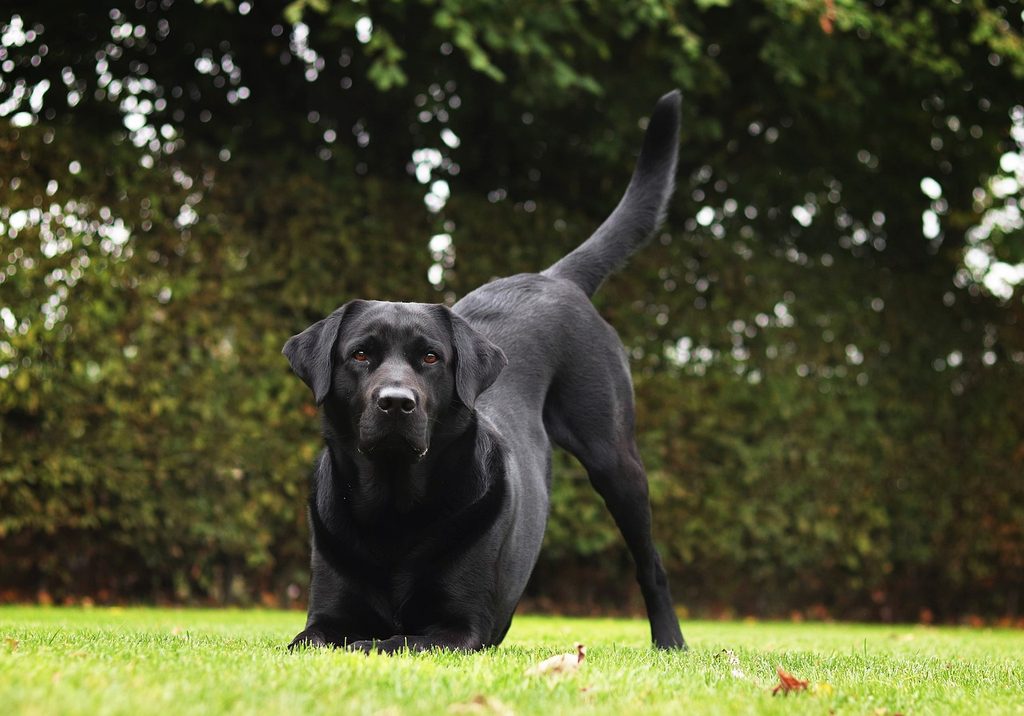
For more than 30 years, the Labrador retriever was America’s most popular dog breed, and it still remains a favorite (though the Frenchie has taken the number one slot). Playful, friendly, and affectionate, black Labs make amazing family pets. Is a black Labrador retriever the perfect pet for your family? Here’s everything you need to know about this happy dog breed.

Are black Labradors good pets?
A medium-to-large-sized breed, Labs weigh anywhere from 55 to 85 pounds, with females being smaller than males. Labs are active, sociable dogs who form lasting bonds with family members but are friendly toward strangers, too. With their double coats and webbed feet, Labs make excellent companions for water-loving families, but they’re also equally at home romping through a yard with kids.
Not only are Labs fantastic dogs for families with children, but they’re also friendly and docile enough to befriend other dogs, livestock, and even the family cat. However, you’ll want to socialize your Lab puppy properly before you introduce them to kids and other pets. Also, Labs love walks and require a tremendous amount of exercise — around 80 minutes a day is best — so make sure to use a high-quality flea and tick preventative to keep your pooch from bringing pests into your home.

What are black Labs known for?
Some breeds, such as St. Bernards, are known for their heroism. Others, like the Afghan hound, are infamously dimwitted. Black Labs, like all other Labrador retrievers, are renowned for being good-natured, eager to please, and just a bit goofy. Labs are definitely people-pleasers, and their inherent gentleness and drive to impress their pet parents help Labs excel in one of the most important fields: service.
This hard-working breed is often trained for use as service dogs, therapy dogs, and even seizure detection dogs. Labs are so friendly and easy to train, it’s no wonder they’re one of the most popular breeds to use as service animals. Not only can a Lab help their human cross a busy intersection, but they can also be trained to fetch medical equipment — and even be taught to call an ambulance if their handler is suffering from a prolonged seizure or loses consciousness due to diabetic shock.

Is a black Lab a Labrador retriever?
While black Labs, chocolate Labs, and yellow Labs have very different coats, they’re all members of the same breed: the Labrador retriever. In fact, black Labs were historically favored over their yellow- and chocolate-hued counterparts. Between the late 1800s and early 1900s, yellow Labs and chocolate Labs were so undesirable they almost went extinct.
Newfoundland placed a steep tax on households with more than one dog, and because black Labs were preferred, the number of yellow Labs and chocolate Labs dropped significantly. Thankfully, yellow Labs and chocolate Labs have made a successful comeback, though black Labs remain the most popular with pet parents.

Is a black Lab right for you?
Labrador retrievers make wonderful companions whether you live alone or have a big family, but only if you’re willing to put in the time and effort to keep your pooch happy. While Labs have relatively low grooming requirements, they shed twice a year. If you’re precious about keeping dog hair off your sofa, a Lab might not be the best option for you. That said, regularly brushing and bathing your dog during the shedding period can help cut down on the amount of hair left behind on your furniture, your floor, and your clothes.
Labs are hard-working, energetic dogs. If you’re frequently away from home or live a primarily sedentary lifestyle, you might look into low-energy breeds instead. It’s important to stay on top of their regimen as these active pups can easily become too sedentary. A recent survey of veterinarians found that roughly 60% of all Labrador retrievers seen in clinics are obese. Why? Even among chowhounds, Labs are notoriously obsessed with food and tend to quickly pack on the pounds.

What are the cons of a black Lab?

Final thoughts on black Labs
If you’ve decided on a Labrador retriever, you’ll want to make sure your fur baby gets plenty of exercise. You can keep your Lab entertained while you’re away from home by hiding toys in strategic locations around the house. Another good option? A puzzle feeder filled with healthy, low-calorie snacks like raw carrots and green beans, which are high in fiber and low in fat. Make sure to spend plenty of time bonding with your dog, and we’re certain you’ll join the ranks of loyal Lab lovers.



